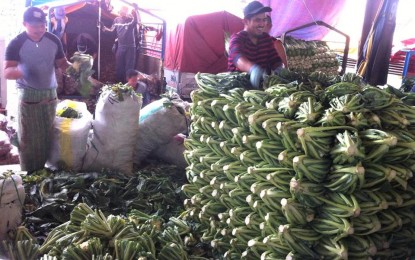
FRESH VEGETABLES. Retail traders at the vegetable trading post in La Trinidad Benguet continue their daily routine of selling their produce locally and to different parts of the country. The prices of vegetables have dropped due to the lack of demand as an effect of the 2019 coronavirus disease scare when festivals and crowd-drawing events were either suspended or canceled. (PNA file photo by Liza T. Agoot)
BAGUIO CITY – The cancelation of festivals and other crowd-drawing events here and parts of the Cordillera Administrative Region due to the coronavirus disease 2019 (Covid-19) threat has adversely affected the vegetable industry in the region, an official of a produce trader's group in Benguet said on Friday.
Benguet Farmers Marketing Cooperative head Agot Balanoy said the last month of 2019 and the first two months of 2020 have been difficult for the vegetable industry.
She said the suspension of the annual Panagbenga or the Baguio Flower Festival, which brings in hundreds of thousands of tourists for the whole duration had also led to the drop in the sales of vegetables locally.
She said the suspension of the Panagbenga has led to hotels, restaurants and resorts’ limiting their orders due to the low demand for food in establishments, with few local and foreign tourists arriving, compared to the other years during the Panagbenga season.
Balanoy said the cancelation of the festivals in other regions prevented people from cooking food for several guests, also caused the drop in the demand for vegetables, substantially reducing the orders at the vegetable trading post.
“Few vegetables are being bought and transported to other regions,” she said.
Balanoy, however, said the supply of vegetables is steady.
“There are no calamities and there is nothing to disturb the production but the demand is just low that it causes prices to drop,” Balanoy said in the Ilocano dialect.
She said since December 2019, traders have been having a difficult time selling their vegetables in Metro Manila where sellers were prevented from peddling on the streets, effectively reducing orders.
The issue of the truck ban in Baguio during the nationwide peak demand for vegetables had also affected the sales of the highland produce.
Balanoy said more or less 130,000 farmers in Benguet supply highland vegetables in different markets nationwide. There are also farmers in Mt. Province and Ifugao, which also produces highland vegetables brought to the trading post.
“The first quarter of the year is a very difficult time in selling highland vegetables at the trading post due to low demand,” said Balanoy as the vegetables being sold even below their production cost.
She said on wholesale prices at the La Trinidad Trading Post, cabbage was sold at PHP4 to PHP8 for the mighty ball variety, the rare ball from PHP6 to PHP10; scorpio at P10 to PHP14 per kilo on February 10.
She said these further dropped to PHP3 to PHP6, PHP4 to PHP7 and PHP6 to PHP10 for the same varieties, respectively on February 28.
Balanoy said wombok (Chinese cabbage) was sold on February 10 between PHP6 to PHP10 and carrots from PHP10 to PHP15 and improved a little on Feb. 28 from PHP5 to PHP10 for wombok and PHP12 to PHP16 for carrots.
Potatoes’ prices remain good from PHP40 to PHP55 a kilo depending on the size, Balanoy said.
Joel Cervantes, municipal information officer of La Trinidad, said the cancelation of crowd-drawing events nationwide due to the Covid-19 scare has led to the drop in the sales of vegetables and the drop in the prices.
“All farmers have good harvest but the real problem right now is the drop in the prices due to the drop in the demand while the supply is very sufficient,” Cervantes said.
He said while the situation is good for the consumers, it is affecting the traders and the farmers who have to face the brunt of the drop in prices with losses due to unsold goods.
Some 1.2 to 1.5 million kilograms of assorted vegetables are transported daily from the trading post going to various markets nationwide. (PNA)
